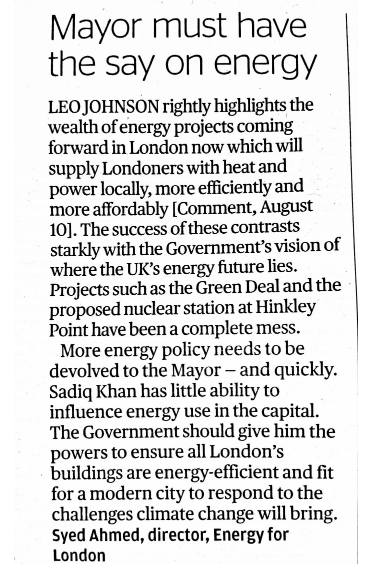November 2016: The London Assembly Environment Committee will be holding an oral evidence session later this week – Thursday 10 November – on home energy efficiency progress in London, and the challenges faced by Londoners living in homes suffering from fuel poverty. An outline paper prepared for the Committee is available here – and the 10am session will be webcast on the following link. Evidence will be provided by National Energy Action, Friends of the Earth and the Energy Saving Trust.
The Mayor last month committed to preparing a Fuel Poverty Action Plan for London (see page 29 of following transcript of 19 October 2016 Question Time session):
“2016/3848 – The Cold Homes Crisis
Leonie Cooper AM In London there are as many as 348,000 fuel poor homes. There is also a clear pattern of increasing depth of fuel poverty in older households. Given these terrible statistics, what action will you take to protect pensioners this winter?
Sadiq Khan (Mayor of London): Thank you for taking this question, Dr Sahota. I am hugely concerned about the levels of fuel poverty in London and its increasing depth amongst older households, which is a national trend and is extremely worrying. I am committed to taking much more of a leadership role. I will look at ways to better target fuel poverty measures in London and produce a Fuel Poverty Action Plan for the capital.
My new Energy for Londoners programme will tackle fuel poverty on a number of fronts. I intend to set up a not-for-profit energy company to ensure fair and affordable bills for Londoners targeting those people who are currently paying above the odds for their energy bills. This includes households with prepay meters and those who have not switched energy supplier in the last couple of years. I will also reinvigorate and develop new homes, energy efficiency programmes and initiatives to both save carbon and cut bills. In addition, I will support the rollout of smart meters, ensuring that Londoners are supported in being able to use their meters to use energy more efficiently. While I am very concerned about the reduction in the Energy Company Obligation budget, I welcome the shift in its focus towards fuel poverty given the absence of any other national fuel poverty energy efficiency support programmes. Continue reading…


